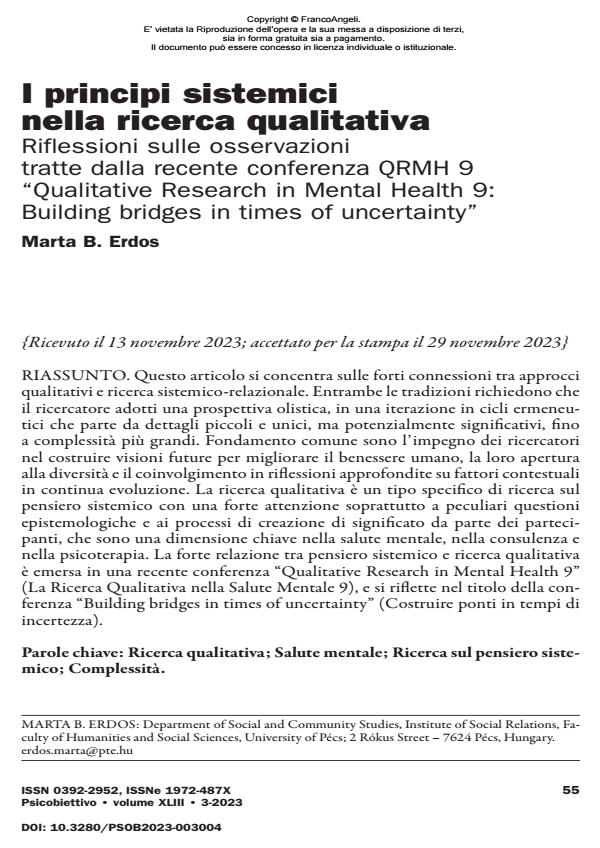I principi sistemici nella ricerca qualitativa Riflessioni sulle osservazioni tratte dalla recente conferenza QRMH 9 "Qualitative Research in Mental Health 9: Building bridges in times of uncertainty"
Titolo Rivista PSICOBIETTIVO
Autori/Curatori Marta B. Erdos
Anno di pubblicazione 2024 Fascicolo 2023/3
Lingua Italiano Numero pagine 11 P. 55-65 Dimensione file 633 KB
DOI 10.3280/PSOB2023-003004
Il DOI è il codice a barre della proprietà intellettuale: per saperne di più
clicca qui
Qui sotto puoi vedere in anteprima la prima pagina di questo articolo.
Se questo articolo ti interessa, lo puoi acquistare (e scaricare in formato pdf) seguendo le facili indicazioni per acquistare il download credit. Acquista Download Credits per scaricare questo Articolo in formato PDF

FrancoAngeli è membro della Publishers International Linking Association, Inc (PILA), associazione indipendente e non profit per facilitare (attraverso i servizi tecnologici implementati da CrossRef.org) l’accesso degli studiosi ai contenuti digitali nelle pubblicazioni professionali e scientifiche.
Questo articolo si concentra sulle forti connessioni tra approcci qualitativi e ricerca sistemico-relazionale. Entrambe le tradizioni richiedono che il ricercatore adotti una prospettiva olistica, in una iterazione in cicli ermeneu- tici che parte da dettagli piccoli e unici, ma potenzialmente significativi, fino a complessità più grandi. Fondamento comune sono l’impegno dei ricercatori nel costruire visioni future per migliorare il benessere umano, la loro apertura alla diversità e il coinvolgimento in riflessioni approfondite su fattori contestuali in continua evoluzione. La ricerca qualitativa è un tipo specifico di ricerca sul pensiero sistemico con una forte attenzione soprattutto a peculiari questioni epistemologiche e ai processi di creazione di significato da parte dei parteci- panti, che sono una dimensione chiave nella salute mentale, nella consulenza e nella psicoterapia. La forte relazione tra pensiero sistemico e ricerca qualitativa è emersa in una recente conferenza “Qualitative Research in Mental Health 9” (La Ricerca Qualitativa nella Salute Mentale 9), e si riflette nel titolo della con- ferenza “Building bridges in times of uncertainty” (Costruire ponti in tempi di incertezza).
Parole chiave:Ricerca qualitativa; Salute mentale; Ricerca sul pensiero sistemico; Complessità.
Marta B. Erdos, I principi sistemici nella ricerca qualitativa Riflessioni sulle osservazioni tratte dalla recente conferenza QRMH 9 "Qualitative Research in Mental Health 9: Building bridges in times of uncertainty" in "PSICOBIETTIVO" 3/2023, pp 55-65, DOI: 10.3280/PSOB2023-003004